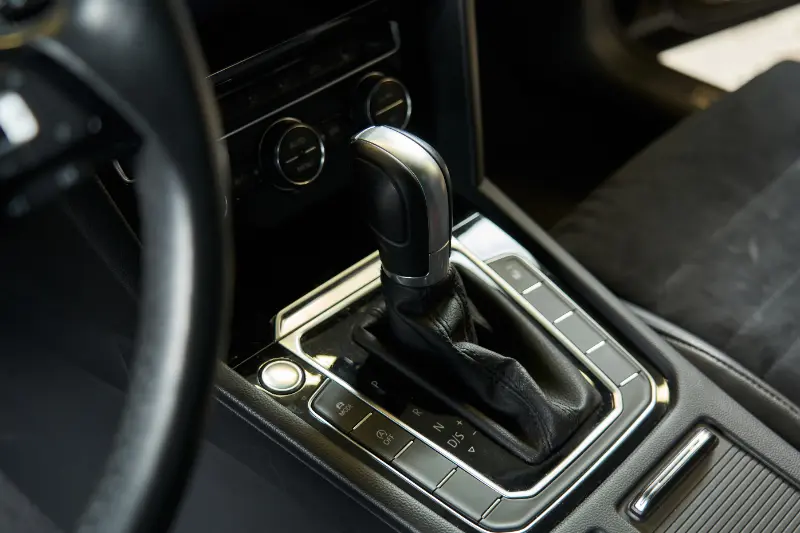Determining how often to service your DSG, especially the 7 speed DSG, is essential for your vehicle’s performance and longevity. Typically, DSG gearboxes require servicing every 40,000 miles, but this can change based on your driving style and other factors. Our article provides a detailed guide on maintaining your DSG, helping you avoid costly repairs and ensuring optimal performance.

Key Takeaways
- DSG gearboxes require regular servicing every 40,000 to 80,000 miles, depending on the model, to prevent clutch slipping, bearing failure, and synchromesh failure. These intervals can vary due to driving habits, performance modifications, or heavy towing.
- Regular DSG maintenance is crucial to avoid costly repairs and transmission failure, maintain optimal performance and fuel efficiency, and preserve the manufacturer’s warranty. Fluid and filter replacements are critical components of DSG servicing and require specialised tools and knowledge.
- DSG gearbox servicing should be handled by professionals, and vehicle owners must decide between franchised dealerships and independent garages for service. DIY servicing is an option, but it requires specific tools and careful consideration of the risks involved with potential costly damages.
Understanding DSG Gearboxes
What Is A DSG Gearbox?
A DSG (Direct Shift Gearbox) is a sophisticated type of automatic transmission that employs a dual-clutch system to deliver seamless and efficient gear shifts. Commonly found in Volkswagen Group vehicles, including popular models from Skoda and VW, the DSG gearbox is engineered for performance-oriented driving. Its design allows for rapid and precise gear changes, enhancing both driving pleasure and vehicle responsiveness. However, to maintain its high performance and extend its lifespan, regular servicing of the DSG gearbox is crucial. This ensures that all components function optimally, preventing potential issues and costly repairs down the line.
Understanding DSG Gearbox Service Intervals
Regular DSG servicing is vitally important for avoiding issues such as clutch slipping, premature shaft bearing failure, and synchromesh failure. In fact, over 250,000 vehicles in the UK alone are equipped with DSG gearboxes, making it vital for vehicle owners to understand the importance of proper service intervals.
Unfortunately, many DSG or S-tronic gearbox owners are not fully aware of the service requirements. This lack of knowledge can lead to gear selection problems and other issues, highlighting the need for regular servicing.
Manufacturer’s Recommendation
The manufacturer’s recommendations for DSG service intervals vary by model, including the 6-speed and 7-speed DSG gearboxes. Typically, DSG gearboxes like the DQ250 6-speed and DL382 7-speed should have their fluid replaced every 40,000 miles, as per the manufacturer’s specification.
However, some variations exist. For instance, the 7-speed DQ381 DSG gearbox has a manufacturer’s recommended service interval of 80,000 miles. It’s always a good practice to check your vehicle’s manual or consult with your dealer for specific recommendations.
Factors Affecting Service Frequency
While manufacturer recommendations provide a baseline, it’s important to remember that certain factors can necessitate more frequent servicing. Aggressive driving habits, for instance, can put additional strain on the DSG gearbox, leading to a need for more regular maintenance to ensure optimal performance.
Similarly, installing high-performance modifications can affect the maintenance frequency, as they require precise vehicle control through reliable power transfer. Heavy towing can also impact DSG clutch maintenance, potentially leading to more frequent service intervals to prevent degradation.
The Importance of Regular DSG Maintenance
Neglecting regular DSG service intervals can lead to poor gear selection, loss of power, and even transmission failure. The complexity of DSG units means that maintenance can be expensive if minor issues are not addressed promptly.
Moreover, regular DSG maintenance is not only essential for preventing costly repairs but also for preserving the manufacturer’s warranty. By adhering to the manufacturer’s recommended service intervals, vehicle owners can ensure both optimal performance and warranty validity.
Preventing Costly Repairs
Ignoring regular DSG servicing can lead to substantial repair costs. For example, clutch replacement and mechatronic unit replacement often amount to thousands of pounds.
Scheduled gearbox oil and filter changes every 40,000 miles can prevent damage to clutch packs and hydraulic valves within the mechatronic unit and avoid other failures like clutch slipping and premature shaft bearing failure. Additionally, using incorrect DSG fluids or improper servicing methods can result in impaired function and potential transmission failure, which is costly to repair.
Maintaining Optimal Performance
Properly maintained DSG clutches, including the clutch pack, contribute to a smoother driving experience with rapid gear changes and seamless power delivery. Furthermore, an improperly maintained DSG clutch can lead to increased fuel consumption and reduced efficiency.
On the other hand, a direct-shift gearbox, when properly maintained, offers faster shifting and can make a vehicle more fuel-efficient.
Critical Components of a DSG Service
A comprehensive DSG service involves more than just an oil change. It includes a detailed inspection of the system, a DSG tune evaluation, and expert recommendations for any identified issues as part of a service plan.
Given the intricate nature of the DSG system, which integrates electronic and mechanical elements, executing service procedures such as oil changes and inspections can be particularly complex and challenging. This complexity underscores the importance of having your DSG gearbox serviced by professionals or gaining sufficient knowledge and equipment if you plan to do it yourself.
Remember, a well-maintained DSG gearbox not only ensures optimal vehicular performance but also saves you from costly repairs in the long run.
Fluid and Filter Replacement
Fluid and filter replacement is a crucial part of DSG servicing. In addition to DSG fluid, it is also important to regularly change the Haldex fluid as part of the service process to ensure optimal vehicle performance. For example, DQ500 7-speed and DL501 7-speed gearboxes require a fluid and filter change every 40,000 miles. Replacing the gear oil filters out debris from the clutch plates, which is vital to prevent clogging and ensure optimal function of the gearbox. Also, it’s worth noting that using incorrect fluids can lead to complications with DSG performance. Hence, it is often recommended to use genuine DSG transmission fluids and filters to maintain gearbox longevity and performance.
Fluid and filter replacement requires specialized tools and accurate fluid level measurements, with the vehicle kept level during the process. A diagnostic tool, like VCDS, is necessary to measure the transmission fluid’s temperature to ensure correct fluid levels as per the factory fill method.
Inspection and Diagnostics
In addition to fluid and filter replacement, regular DSG servicing includes checks on the transmission’s fluid and filter, engine coolant, and detection of unusual noises that may indicate mechanical issues.
A DSG service specialist can:
- Diagnose and address issues with the DSG transmission
- Prevent problems such as gear selection issues, power loss, and full transmission failure
- Provide thorough diagnostics and timely interventions during servicing to mitigate the risk of complete transmission failure.

Choosing the Right Service Provider
Choosing the right service provider for your DSG gearbox in South Wales is just as important as servicing it. This decision often involves a choice between franchised dealerships, independent garages, and other sites, taking into account members’ location preferences.
Franchised dealers use genuine manufacturer-approved parts and fluids, which helps maintain the vehicle’s warranty and resale value. However, the quality of service for DSG transmissions at Volkswagen dealerships can vary widely. On the other hand, independent garages, often preferred by users over Volkswagen dealerships for DSG servicing due to their more personalised service approach, can include a skilled vag specialist.
Dealerships vs. Independent Garages
Dealerships, including main dealer locations, utilise manufacturer-approved parts and fluids, which is beneficial for warranty preservation and may increase resale value. Technicians at dealerships have access to brand-specific knowledge and specialised equipment, often leading to quicker service turnaround in their service dept.
On the other hand, independent garages often provide more cost-effective labour rates, lower overhead costs, and utilise third-party parts, which are advantageous for out-of-warranty vehicles. Choosing between a dealership and an independent garage may involve a trade-off between higher costs at dealerships due to brand-specific resources and lower costs at independent garages with more affordable labour.
Finding a Reputable Mechanic
After deciding between a dealership and an independent garage, the next step is to find a reputable mechanic. Networks of garages and mobile mechanics can be used to locate local DSG repair specialists who are qualified to handle the specific needs of a vehicle’s gearbox.
Technicians in the independent sector frequently bring a wealth of experience from their time in franchise dealer workshops, where they developed expertise with technologies such as those found in DSG gearboxes. Therefore, choosing an experienced mechanic is crucial for the longevity and performance of your DSG gearbox.
DIY DSG Servicing: Is It Worth It?
While professional DSG servicing is recommended, doing it yourself can be an option for some car owners. Performing DSG servicing at home can be manageable and less expensive than dealership costs, providing potential savings.
However, it’s important to remember that incorrect DIY DSG servicing can result in costly damages. Before attempting a DIY DSG service, car owners must carefully consider whether the monetary savings are worth the potential damages.
Required Tools and Equipment
Specific tools and equipment are required to embark on a DIY DSG servicing journey. For instance, tools like a VAS6262 or equivalent are utilised for bottom filling the DSG fluid, and a VCDS cable and software for the service.
A special DSG fill adapter is essential and cost-effective for the service. A DIY DSG service kit typically contains a filter, a crush washer, and the proper amount of transmission fluid required for one service.
Potential Pitfalls
DIY DSG servicing comes with its own set of challenges. For instance, performing a DIY DSG service necessitates starting with a cold engine and ensuring the vehicle is level to maintain the correct fluid level.
Some common mistakes to avoid during a DIY service include:
- Over-tightening components like the fill tube can result in cracking and potential leaks
- Inaccurately measuring temperatures and fluid levels can lead to significant errors in the service process
- Not correctly interpreting warning lights that may appear after the battery is reinstalled could indicate unresolved issues that could cause further damage.
Benefits of a DSG Gearbox Serviced by a Professional
Opting for professional servicing of your DSG gearbox offers several significant benefits:
- Improved Performance: A well-serviced DSG gearbox ensures faster and smoother gear shifts, enhancing your overall driving experience.
- Increased Fuel Efficiency: Proper maintenance can improve your vehicle’s fuel efficiency, helping you save on fuel costs over time.
- Extended Lifespan: Regular servicing helps prolong the life of your DSG gearbox, reducing the likelihood of expensive repairs or replacements.
- Warranty Protection: Professional servicing helps maintain your vehicle’s warranty, providing peace of mind and coverage in case of any issues.
By entrusting your DSG gearbox to a professional, you ensure that it receives the meticulous care and expertise required to keep it running at its best.
Ivydene Garage Ltd. is the Best in the UK for DSG gearbox Servicing
Ivydene Garage Ltd. prides itself on its team of highly skilled technicians who are equipped with the latest diagnostic and service equipment. Whether it’s diagnostics, maintenance, or repairs, Ivydene Garage Ltd. ensures professional and efficient automotive solutions for a wide range of vehicle makes and models, including light commercial vehicles.
Entrusting your DSG servicing to Ivydene Garage Ltd. gives you peace of mind, knowing that your vehicle is in the hands of experts committed to maintaining its performance and reliability. With its dedication to quality service and extensive experience, Ivydene Garage Ltd. is your trusted partner for all your automotive needs in the Ashford area and beyond.
Summary
In conclusion, regular DSG servicing is a vital aspect of vehicle maintenance, especially for those equipped with DSG gearboxes. It is essential to understand the manufacturer’s recommended service intervals, the importance of regular maintenance, and the critical components of a comprehensive DSG service.
Whether you opt for professional servicing or decide to take on the task yourself, remember that the right tools, knowledge, and adherence to recommended service intervals can help maintain optimal performance and prevent costly repairs. When it comes to DSG servicing, an ounce of prevention is worth a pound of cure.
Frequently Asked Questions
Here are some frequently asked questions about DSG servicing:
How often should I service my DSG gearbox?
The recommended service interval for a DSG gearbox varies depending on the vehicle and driving conditions. Typically, it is advised to service your DSG gearbox every 40,000 to 80,000 miles.
What happens if you don’t do DSG service?
Not changing the DSG oil can lead to gearbox overheating, causing the clutch to burn out and causing gear selection issues, loss of power, and transmission problems. It is essential to service the DSG regularly to avoid these issues.
How often should I service my DSG gearbox?
You should service your DSG gearbox according to the manufacturer’s recommendations, which typically range between 40,000 and 80,000 miles.
What is included in a DSG service?
A DSG service typically includes fluid and filter replacement, system inspection, and expert diagnostics. This will ensure proper maintenance of your vehicle’s DSG system.
What are the benefits of regular DSG servicing?
Regular DSG servicing can prevent costly repairs, maintain the manufacturer’s warranty, and improve the driving experience with smoother gear changes and better fuel efficiency. It’s a worthwhile investment for your vehicle.
What tools do I need for DIY DSG servicing?
You will need specific tools such as a VAS6262 or equivalent, a VCDS cable and software, and a special DSG fill adapter for DIY DSG servicing. These tools are essential for the task at hand.
Can I service my DSG gearbox myself?
While it is possible to service your DSG gearbox yourself, it is recommended to have it done by a professional to ensure that it is performed correctly and safely.
By addressing these common questions, we hope to provide clarity and emphasize the importance of regular DSG servicing for maintaining your vehicle’s performance and longevity.
